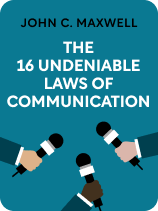

This article is an excerpt from the Shortform book guide to "The 16 Undeniable Laws of Communication" by John C. Maxwell. Shortform has the world's best summaries and analyses of books you should be reading.
Like this article? Sign up for a free trial here.
How can you involve other people in preparing for a presentation you’re giving? What are your particular speaking strengths?
Speaking is a skill that’s in demand in every field. In The 16 Undeniable Laws of Communication, internationally renowned speaker John C. Maxwell shares his secrets to becoming a confident and effective communicator capable of delivering any message to any audience.
Read more for an overview of this practical book.
Overview of The 16 Undeniable Laws of Communication
According to Maxwell, anyone can master public speaking by following The 16 Undeniable Laws of Communication he’s developed from a lifetime of public speaking. When you follow his advice on how to craft a powerful message and connect with your audience, you’ll be able to influence others and make a lasting impact with your words in all areas of your life.
Maxwell is an acclaimed speaker, leadership expert, and a New York Times bestselling author. Since discovering his passion for speaking as a pastor, Maxwell estimates that he’s spoken over 13,000 times throughout his career. He has founded several leadership training organizations, such as the Maxwell Leadership Foundation and EQUIP Leadership.
We’ve organized and consolidated Maxwell’s 16 laws into three parts. First, we’ll cover the key characteristics you need to become an authentic and credible communicator. Next, we’ll explore Maxwell’s strategies for preparing for your presentation and crafting your message. Lastly, we’ll discuss methods to engage and connect with your audience when delivering your message.
Part 1: How to Become an Authentic and Credible Speaker
According to Maxwell, effective communication starts with the speaker: Your identity, actions, and values affect the way you speak and how others view you. Before you can sway your audience with your words, you must first win them over with your character. According to Maxwell, effective speakers have three characteristics: They focus on connection, develop their credibility, and pursue constant learning. In this section, we’ll look at how to develop these three characteristics.
Communicate for Connection
According to Maxwell, your primary goal when communicating should be to connect with your audience and to provide them with valuable and meaningful content. Connection is crucial because it breaks down barriers that prevent people from listening to you, which makes them more receptive to you and your ideas. To build a connection with your audience, Maxwell suggests you give them your full focus when speaking—pay attention to their needs instead of trying to make yourself or your message appear flawless. People won’t care about your words if they don’t believe you care about them.
To show the audience that you care, actively put yourself in their shoes: Consider what they feel, think, and desire, and make them feel valued in ways that are important to them. You can do this by interacting with them, expressing your gratitude, or celebrating their accomplishments. Maxwell suggests you make your audience more receptive to you by removing mental and physical barriers. For instance, be friendly and create a comfortable atmosphere so that your audience feels at ease. Or, instead of standing behind a large podium, try sitting by the edge of the stage.
When you focus on your audience and make them feel good, you make a positive first impression, Maxwell writes. When your audience feels positive about you, they will naturally like you more and be more open to your ideas.
Strengthen Your Credibility
To become a compelling speaker, you must establish your credibility—your trustworthiness and believability. When audiences view you this way, they’ll take you more seriously and will be more willing to consider your message. Maxwell suggests several ways to make yourself more credible.
1. Ensure your message matches your true beliefs. To be credible in the eyes of others, you must genuinely believe in the message you’re delivering. Learn to understand and accept your authentic self so you can communicate your true beliefs with consistency and sincerity. When you’re confident in your message, you naturally use more powerful language and convey more emotion. When your audience believes your words are sincere, they’ll be more open to listening to you.
2. Support your words with your actions. Follow your own advice before giving it to others. Otherwise, you risk people viewing you as a hypocrite, and they may be less likely to listen to you. For example, if you argue that organization is key to productivity, but you display an obvious lack of organization, your audience won’t be receptive to your message.
3. Develop the necessary expertise to speak about your subject. Maxwell writes that you must first learn, build skills, and become knowledgeable in the area you want to discuss. By dedicating time and effort to becoming competent in your field, people will perceive you as more trustworthy and credible when you present your ideas.
Be a Lifelong Learner
Many of us assume that good communicators simply have a natural gift. Maxwell argues, however, that this isn’t true: Speaking well in front of an audience requires dedicated practice, and you must treat it as a lifelong learning endeavor. Effective speakers know that there are always better ways to connect with their audiences and deliver more engaging messages.
To continually learn and improve your communication skills, Maxwell offers two tips:
1. Learn from others. Good communication takes time and experience. By watching other speakers, you can learn from their experiences and gain new ideas more quickly than if you practice your speaking skills through trial and error alone. Make use of a variety of resources—attend a TED Talk, watch YouTube videos, or read transcripts of historical speeches, for instance.
2. Grow your knowledge. Maxwell suggests you continually research new topics and try new experiences to gain fresh perspectives and ideas that you can speak about. Collect quotes, stories, facts, and other information that resonate with you in your daily life. This ensures you have a well of good content that you can draw upon when needed.
Part 2: How to Prepare For Your Presentation
Now that you know the three characteristics of an effective speaker, let’s discuss how you can prepare for your presentation and create a strong message. According to Maxwell, even experienced speakers prepare extensively before speaking in front of an audience. Being well-prepared not only improves your ability to connect with and bring value to your audience, but it also helps you develop your communication skills as you reflect on your ideas and plan your approach. Maxwell presents several ways to create a compelling message and prepare for your presentation.
Team Up With Others
Maxwell suggests you gather a team of people to help you brainstorm ideas for your message and prepare for your presentation. He recommends finding people who are open to new ideas, are flexible when tackling problems, and believe that there are many different ways to solve a problem. Maxwell argues that groups often come up with better ideas than individuals. When you brainstorm by yourself, you can only work from a single perspective. When you collaborate with others, you have access to diverse experiences and insights, which can help you recognize blind spots in your thinking.
When brainstorming, encourage people to come up with as many ideas as they can. Maxwell argues that there are no bad ideas—every thought can be a springboard for greater ideas. You can also have your team ask you challenging questions so you can identify and address potential flaws in your arguments from the beginning.
Identify Your Natural Strengths
Before you write your message, it may be helpful to identify your natural speaking strengths so you can build them into your presentation. While learning from other speakers can give you techniques and methods to experiment with, you should write your message in your own voice. If you try to take an approach that doesn’t come naturally to you, like revealing a personal story that you’re not comfortable sharing, you risk losing your connection with your audience.
Maxwell writes that there are four primary strengths you can leverage. Identify which ones come most naturally to you and emphasize them in your presentation:
1. Sincerity: You communicate with authenticity and vulnerability. This might mean sharing stories of your personal struggles and expressing your true emotions. When you open yourself to your audience, they’ll find it easier to trust you.
2. Humor: If you’re naturally funny, try incorporating jokes into your message. Laughter increases feelings of intimacy in your audience and makes them more receptive to your words.
3. Helpfulness: If you’re motivated to help people, focus on offering more practical advice. People appreciate and think more highly of you when you give them the tools to improve their lives.
4. Inspiration: If you tend to see the best in others, you can use your words to inspire them. When you help others envision a better life and show them that it’s achievable, they’ll feel better about themselves and be more willing to hear what you have to say.
Write Your Message
Once you’ve prepared for your presentation with your team and identified your strengths, write your ideas into a clear and engaging message that will make a lasting impression. Maxwell describes several steps for turning your research and preparation into a memorable message:
1. Develop your thesis. This should be a single sentence that sums up your message. Maxwell writes that you must clarify your thesis before communicating anything—if you don’t know your thesis, your audience will have an even harder time understanding it.
2. Research and plan out your talking points. Create a basic outline of your main points and gather supporting material such as data, stories, and ideas. Maxwell recommends you experiment with ways to organize your main points so that the audience sees how they’re all connected: Consider numbering them, arranging them in an acrostic (a word that has each of its letters spelling out a new word or sentence), or using a common word in each of your major points. Once you have your basic organization, you can then sort the supporting material you’ve gathered under the relevant points.
3. Plan your transitions. Once you have your main points in order, plan out how you can shift smoothly from one point to the next. At the start of your presentation, don’t just jump into your thesis, but find a way to lead into it. Consider using a quote, telling a story, asking a question, or simply taking time to connect with the audience. As you progress through your presentation, Maxwell suggests using various cues to indicate when you’re transitioning to a new point. Make a note to pause, walk to a different spot in the room, change your facial expressions, or vary the volume, speed, or tone with which you speak.
Engage Your Audience With Visuals and Stories
When creating your message, Maxwell suggests you use visual imagery and storytelling to keep your audience engaged as you speak. These strategies make it easier for your audience to grasp your arguments and remember them.
First, incorporate visuals into your presentation. You can use body language, metaphors, or actual visual aids like physical props and imagery to help illustrate your ideas. Maxwell explains that people remember images better than words and that most people are visual learners.
Second, Maxwell suggests you tell the audience a story to make your points more accessible and engaging. He explains that people remember stories because we naturally use stories to make sense of our lives. You can tell stories from your personal life or share the stories of others, but make sure that they’re relevant to your audience and the points you’re trying to make.
Simplify Your Message
When writing your message, Maxwell recommends you simplify your ideas to be clear, concise, and memorable so that your audience can better understand and remember them.
First, to simplify your message, use language that an eighth grader can understand, and trim excess information that might distract from your main points. Many speakers are afraid of being simplistic, but Maxwell argues that “simple” doesn’t mean you’re watering down your ideas or glossing over complex topics. Instead, “simple” means making your content practical and easy for your audience to understand rather than trying to sound impressive.
Second, make your message memorable by coming up with unique and catchy phrases. Try putting a spin on well-known sayings, such as changing “Practice makes perfect” to “Practice makes character.”
Part 3: How to Deliver Your Message
Now that you know how to prepare and create your message, let’s shift our focus to speaking in front of an audience. Maxwell offers suggestions on how to connect with your audience, maintain their attention, and make a lasting impression.
Believe in Yourself and Your Audience
According to Maxwell, your mindset, energy, and feelings affect how your audience receives you and your message. The more you believe in yourself and your speaking ability, the more your audience will. To be a more powerful communicator, Maxwell encourages you to adopt two beliefs:1. Believe in your ability to communicate. Your self-confidence affects how you perform in front of an audience. If you show that you’re nervous, your audience will be more concerned about you than your message. Maxwell suggests you start small and develop a mantra: a short affirming statement to remind yourself that you’re able to communicate well and make a difference with your words.
2. Believe you can help your audience. When you believe your message can positively impact people’s lives, your audience will sense your passion and become more excited about your ideas. Maxwell also suggests believing that your audience wants to learn from you. If you approach your speech with the mindset that people are eager to listen, your words will be more encouraging. On the other hand, if you doubt that anyone’s interested in what you have to say, your words may lack conviction and be less persuasive.
Read the Room and Adapt
As we discussed earlier, preparation is essential to communicating your message to an audience. However, this doesn’t mean sticking rigidly to a script. Situations change and unexpected obstacles arise. To communicate well, you must measure how the audience is responding to you and adapt on the spot to engage audiences that are indifferent or distracted.
Before you’re scheduled to speak, Maxwell recommends you get a better sense of how your audience might respond to you by inspecting the location ahead of time and considering the type of event you’re speaking at. Look at factors such as lighting, sound, the location of projector screens, and the overall setup and size of the room. This allows you to rearrange or correct anything or, at the very least, get clues as to whether the audience will be comfortable and engaged or reluctant and unresponsive.
If, during your talk, you read the room and notice that the audience is unengaged, here are a few suggestions on how to recapture their attention on the fly:
1. Interact with the audience. Get the audience to interact by asking questions that require them to shout out answers or raise their hands. You can also encourage them to say or share something with a neighbor.
2. Do something unexpected. If you notice your audience is losing interest, Maxwell suggests you be spontaneous and do something that the audience didn’t anticipate to grab their attention. For example, you could bring your pet or young child on stage if they inspired one of your ideas.
3. Use pauses strategically. Pauses can help emphasize your point and give audience members time to process your message. You can also pause to recapture people’s attention. When you stop talking, people naturally return their focus to you as they wonder what caused the sudden silence.
Inspire People to Take Action
Maxwell writes that the ultimate goal of a speaker is for your audience to take action after hearing your message. Speaking to people doesn’t directly change their lives—your words must drive them to make a change. Maxwell recommends several ways you can convince your audience to take action.
1. Tell personal stories. Encourage people to take action by sharing stories about how you acted upon your advice. Your personal stories can act as proof of how your message works in real life. For example, if you tell your audience to meditate for an hour every day and explain how you came up with your lucrative business idea during one of your meditative sessions, people will be more motivated to heed your advice.
2. Help them visualize the positive change. Paint a picture of what their lives will look like if they act on your message. This gives your audience a glimpse of how they might feel if they take your advice and motivate them to take action.
3. Show them the first step. Maxwell suggests you make it clear how audience members can take the first step, whether it’s practicing better financial habits or improving their relationships. If you only provide the end result, people can feel overwhelmed and unsure of how to reach it. Encouraging people to take the first step is important, Maxwell argues, because action breeds confidence, which empowers people to take further action to improve themselves and their lives.

———End of Preview———
Like what you just read? Read the rest of the world's best book summary and analysis of John C. Maxwell's "The 16 Undeniable Laws of Communication" at Shortform.
Here's what you'll find in our full The 16 Undeniable Laws of Communication summary:
- The secrets to becoming a confident and effective communicator
- How anyone can master public speaking, no matter how nervous they get
- How to write a clear and engaging speech






